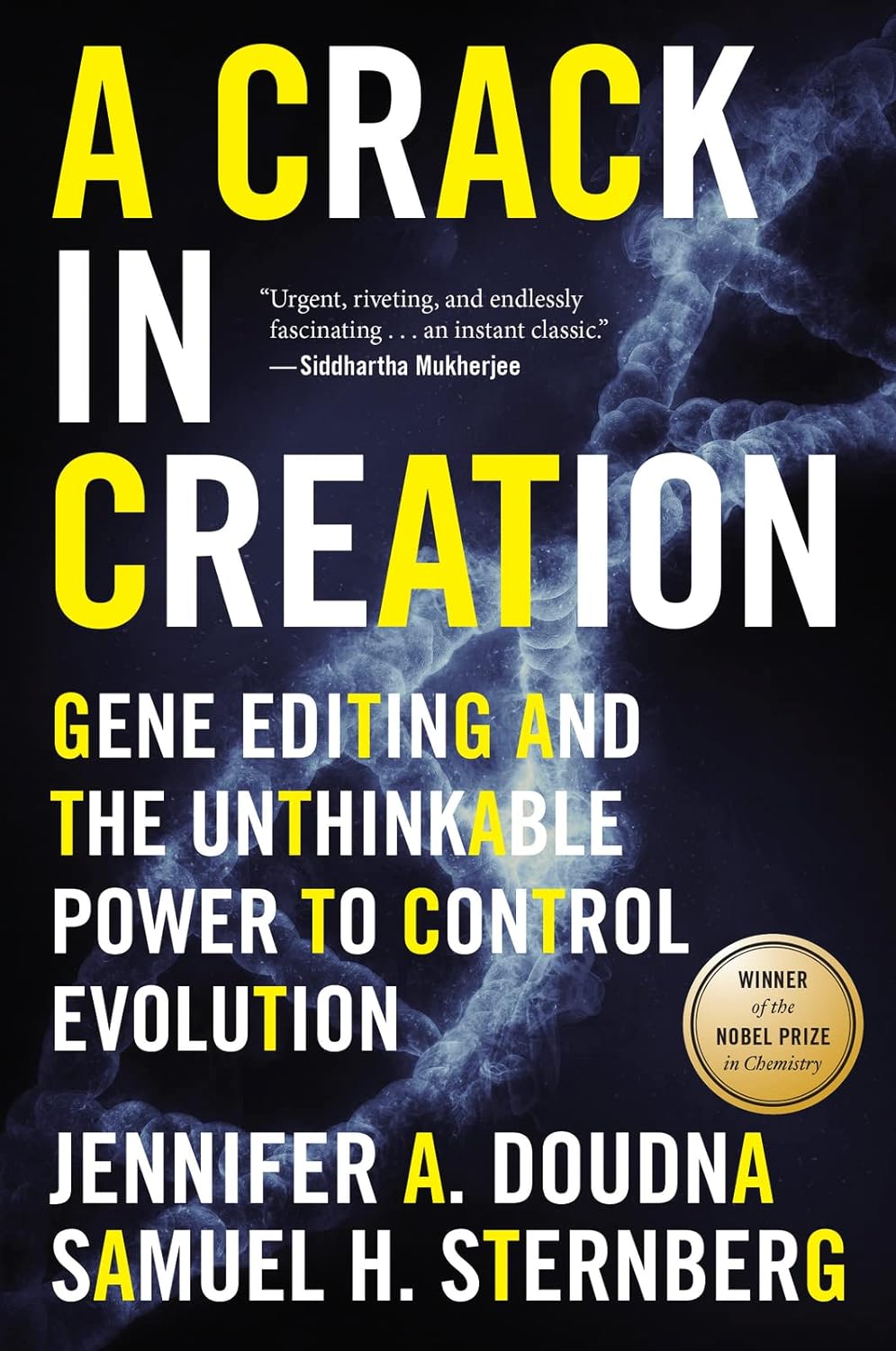Jennifer A. Doudna, Samuel H. Sternberg
A Crack In Creation: Gene Editing and the Unthinkable Power to Control Evolution (BY THE WINNER OF THE 2020 NOBEL PRIZE IN CHEMISTRY)
A Crack In Creation: Gene Editing and the Unthinkable Power to Control Evolution (BY THE WINNER OF THE 2020 NOBEL PRIZE IN CHEMISTRY)
Couldn't load pickup availability
Share
BY THE WINNER OF THE 2020 NOBEL PRIZE IN CHEMISTRY | Finalist for the Los Angeles Times Book Prize
“A powerful mix of science and ethics . . . This book is required reading for every concerned citizen—the material it covers should be discussed in schools, colleges, and universities throughout the country.”— New York Review of Books
Not since the atomic bomb has a technology so alarmed its inventors that they warned the world about its use. That is, until 2015, when biologist Jennifer Doudna called for a worldwide moratorium on the use of the gene-editing tool CRISPR—a revolutionary new technology that she helped create—to make heritable changes in human embryos. The cheapest, simplest, most effective way of manipulating DNA ever known, CRISPR may well give us the cure to HIV, genetic diseases, and some cancers. Yet even the tiniest changes to DNA could have myriad, unforeseeable consequences, to say nothing of the ethical and societal repercussions of intentionally mutating embryos to create “better” humans. Writing with fellow researcher Sam Sternberg, Doudna—who has since won the Nobel Prize for her CRISPR research—shares the thrilling story of her discovery and describes the enormous responsibility that comes with the power to rewrite the code of life.
“The future is in our hands as never before, and this book explains the stakes like no other.” — George Lucas
“An invaluable account . . . We owe Doudna several times over.” — Guardian


Editorial Reviews
Finalist for the L.A. Times Book Prize
One of Science News' "Favorite Books of the Year"
“The first book on CRISPR to present a powerful mix of science and ethics…This book is required reading for every concerned citizen—the material it covers should be discussed in schools, colleges, and universities throughout the country.”—New York Review of Books
“Fascinating… When people refer to CRISPR now, they talk about wiping out disease, resurrecting woolly mammoths, and fashioning designer babies. Such implications fascinate and torment Doudna, and she writes about them movingly with Samuel Sternberg, a biochemist and former research colleague, inA Crack in Creation.”—Bloomberg Businessweek
"An essential start to educating the public...reveal[s] the complex, interlocking, and thoroughly international nature of today’s bioscience...CRISPR heralds a new era of massively increased human control over life, one that will affect every person on Earth, directly or indirectly, and much of the rest of our planet’s biosphere. If humans are to have any chance of harnessing its benefits, avoiding its risks, and using it in ways consistent with our values and cultures, then we all — not just the scientists, ethicists, and patent lawyers — need to understand something about CRISPR and its implications. A Crack in Creation is a great place to start."—Los Angeles Review of Books
"An invaluable account, by Doudna and Samuel Sternberg, of their role in the revolution that is genome editing...It is unusual to have a popular account of a great scientific breakthrough written by the protagonist, so soon after its discovery. Watson’s The Double Helix appeared 15 years after the work. We owe Doudna several times over – for her discovery, for her zeal to take it from the lab into the clinic, for her involvement in the ethical issues raised, for her public engagement work, and now for this book. It’s a fine weapon against the still far too large tribe of those who don’t believe in the power of very small things."—Guardian (UK)
"[A Crack in Creation] opens with the stark observation that the revolution in gene editing launched by CRISPR 'offers both the greatest promise and, arguably, the greatest peril for the future of humanity.' The first half of the book is a history of CRISPR’s development and a lucid explication of how it works. The authors describe the electrifying atmosphere of a laboratory at the front edge of discovery, while generously distributing credit to the legion of scientists who preceded Doudna and Chapentier or have carried their work forward...The book’s second half is an examination of CRISPR’s great potential to eliminate or cure disease and improve human existence in myriad ways, and of the perils it poses for humanity’s future."—Los Angeles Times
“A Crack in Creationis a powerful testament to the role of curiosity and tenacity in scientific research, and also an urgent plea from the celebrated biologist whose discovery enabled us to rewrite the code of life. The future is in our hands as never before, and this book explains the stakes like no other.”—George Lucas, filmmaker
About the Author
JENNIFER A. DOUDNA, Ph.D. is a professor in the Chemistry and the Molecular and Cell Biology Departments at the University of California, Berkeley, investigator with the Howard Hughes Medical Institute, and researcher in the Molecular Biophysics and Integrated Bioimaging Division at the Lawrence Berkeley National Laboratory. She is internationally recognized as a leading expert on RNA-protein biochemistry, CRISPR biology, and genome engineering. She lives in the Bay Area.SAMUEL H. STERNBERG, Ph.D., is a biochemist and author of numerous high profile scientific publications on CRISPR technology. He is starting his own laboratory at Columbia University, as assistant professor in the Department of Biochemistry and Molecular Biophysics, beginning in 2018. He lives in New York City.
------
JENNIFER A. DOUDNA, Ph.D. is a professor in the Chemistry and the Molecular and Cell Biology Departments at the University of California, Berkeley, investigator with the Howard Hughes Medical Institute, and researcher in the Molecular Biophysics and Integrated Bioimaging Division at the Lawrence Berkeley National Laboratory. She is internationally recognized as a leading expert on RNA-protein biochemistry, CRISPR biology, and genome engineering. She lives in the Bay Area.SAMUEL H. STERNBERG, Ph.D., is a biochemist and author of numerous high profile scientific publications on CRISPR technology. He is starting his own laboratory at Columbia University, as assistant professor in the Department of Biochemistry and Molecular Biophysics, beginning in 2018. He lives in New York City.
Product details
-
Publication
Mariner Books
-
Author
Jennifer A. Doudna, Samuel H. Sternberg
-
Language
English
Lexile:
-
Pages
304
-
ISBN-13
9781328915368



